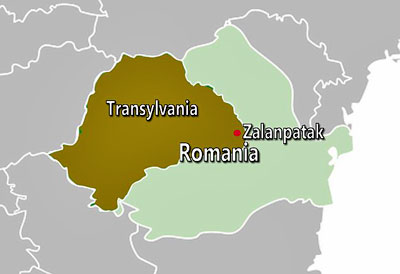
by Damien Gayle
27 October 2011
from
TheDailymail Website
Prince Charles is campaigning to save the
forests of Transylvania, inspired by his ancestral links to
Vlad the Impaler, the 15th
century nobleman better known by his patronym, Dracula.
Rapid economic growth in Romania - which is now part of the EU - means that
the forests of the Carpathian Mountains are under threat from development
and logging.
The Prince is calling for the forests, some of the last untouched wilderness
areas in Europe, to be protected before they are lost, like the woodland
that once covered Britain.
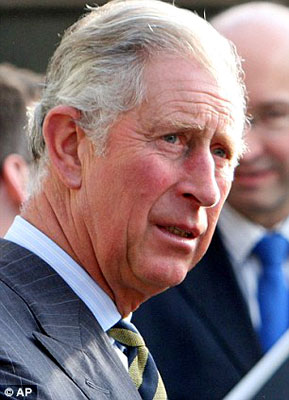
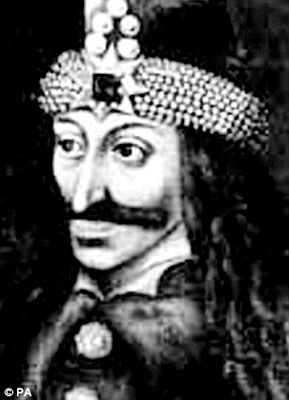
Blood lines:
Prince Charles, left, is
descended from Transylvanian prince Vlad III,
known by the sobriquet Vlad
the Impaler and the patronym Dracula, right,
through his
great-grandmother, Queen Mary, wife of George V
He claims a family connection to the area
through Vlad III, Prince of Wallachia, who earned the sobriquet Vlad
the Impaler thanks to his favored method of torture and execution.
The 15th century nobleman, notorious for his bloodthirsty
campaigns against the Ottomans and fierce repression of his people, is a
distant ancestor of Charles's great-grandmother, Queen Mary.
The total number of his victims is estimated in the tens of thousands, many
killed by being impaled on huge metal stakes.
His reputation for cruelty is said to have helped inspire Bram Stoker's
diabolical villain, Count Dracula.
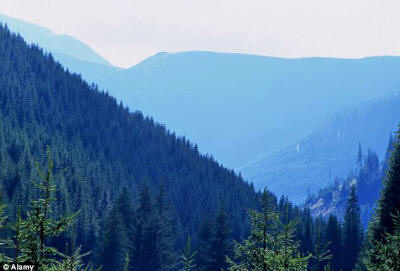
Virgin:
The forests of the Carpathian
Mountains,
some of the last untouched
wilderness areas in Europe,
are under threat from
development and logging
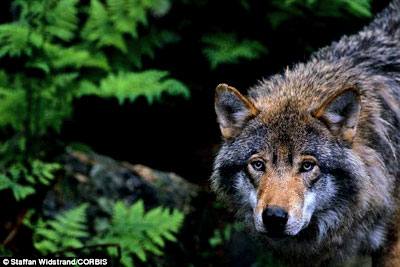
Biodiversity:
A European grey wolf stalks
the forest of Transylvania.
The area is also home to
brown bears, lynx, and 13,000 other species
In a new documentary about the Carpathian
mountains, Charles makes fun of his ancestral links to 'Count Dracula'.
'The genealogy shows I am descended from
Vlad the Impaler, so I do have a bit of a stake in the country,' he
quipped.
The Prince has recently bought a five-bedroom
house in the village of Zalanpatak, which is said to have been founded by
one of his Transylvanian ancestors.
Charles is expected to use the 150-year-old home as an isolated holiday
retreat, and it will be used as a guesthouse when he is not in residence.
The Prince first visited Transylvania in 1998 and has bought three
properties there, including the Zalanpatak house and a £43-a-night
guesthouse in the village of Viscri.
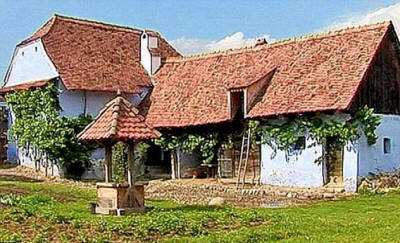
Old haunt:
The farmhouse in Viscri,
Transylvania,
that Charles
bought in 2006 and turned into a guesthouse
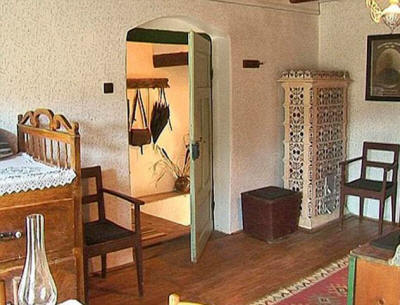
Fit for a future king:
Inside the 18th century
farmhouse in Viscri,
now restored as a guest
house after it was purchased by the Prince of Wales
Traditional farming and building techniques used
in the area are said to have inspired his plans for Poundbury, the Dorset
village created by his Duchy of Cornwall.
HOW THE ROYAL FAMILY IS LINKED TO COUNT
DRACULA
Count Dracula is related to
Britain's royal family both genealogically and through a
medical condition that gives sufferers a thirst for blood.
It is believed that Queen Mary, consort of George V, was
related to the 15th Century slayer Vlad the
Impaler, who was also known as Dracula
Vlad is said to have dispatched more than 100,000 Turkish
warriors in battle. The vampire legend was fed by his
predilection for eating bread dipped in his victim's blood.
And it is known that
porphyria, an iron
deficiency, which is thought to lie behind the vampire myth
and may have spurred Vlad's taste for blood, has run in
the Royal Family.
He has since sold a manor near the medieval town of Sighisoara, while the
Viscri and Zalanpatak guesthouses are managed by Count Tibor Kalnoky.
'It seems to me in Transylvania there is a
combination of the natural ecosystem with a human cultural system,' the
prince told the documentary, according to the Daily Telegraph.
'This extraordinarily unique integrated relationship is so hugely
important. People are yearning for that sense of belonging and identity
and meaning.'
If development goes ahead, Romania could end up
barren like swathes of the Highlands of Scotland or Canada that were once
dense with virgin forest, Prince Charles warned.
Two-hundred-and-fifty-thousand hectares of virgin forests are in urgent need
of protection, according to Magor Csibi, country manager of the World
Wildlife Fund's Danube-Carpathian program in Romania.
The area, home to brown bears, lynx, wolves, and 13,000 other species,
represents up to 65 per cent of Europe's remaining virgin forests.
